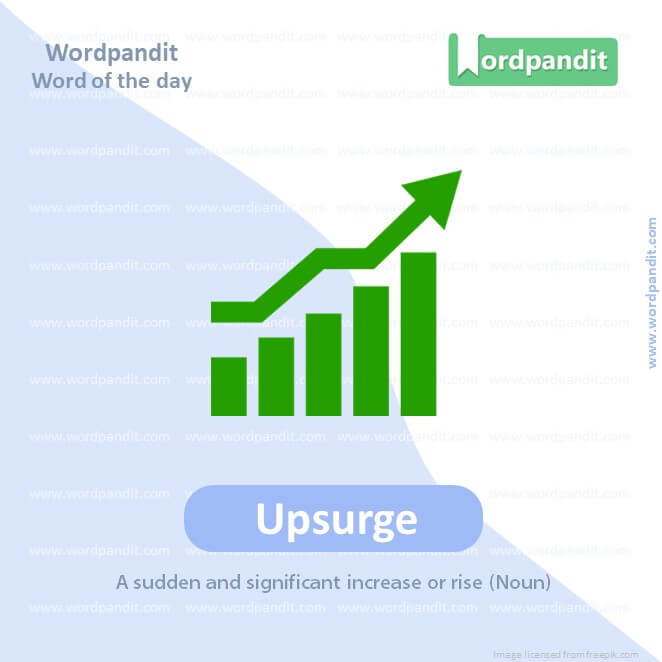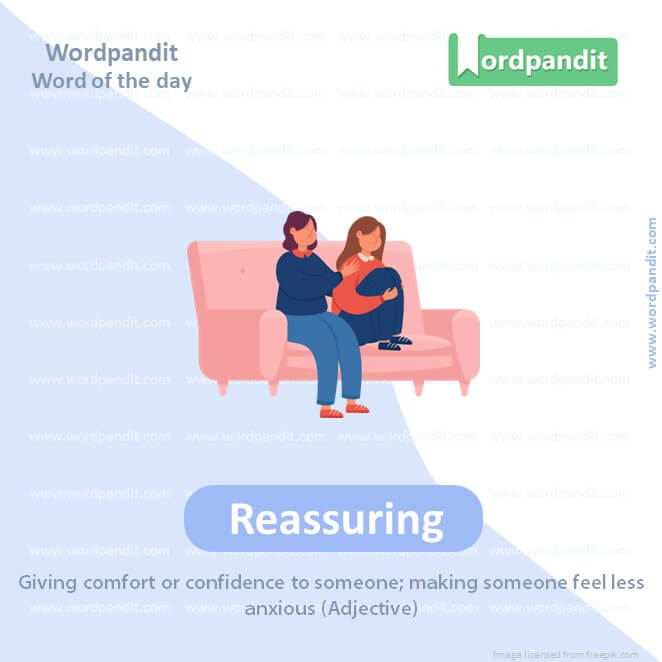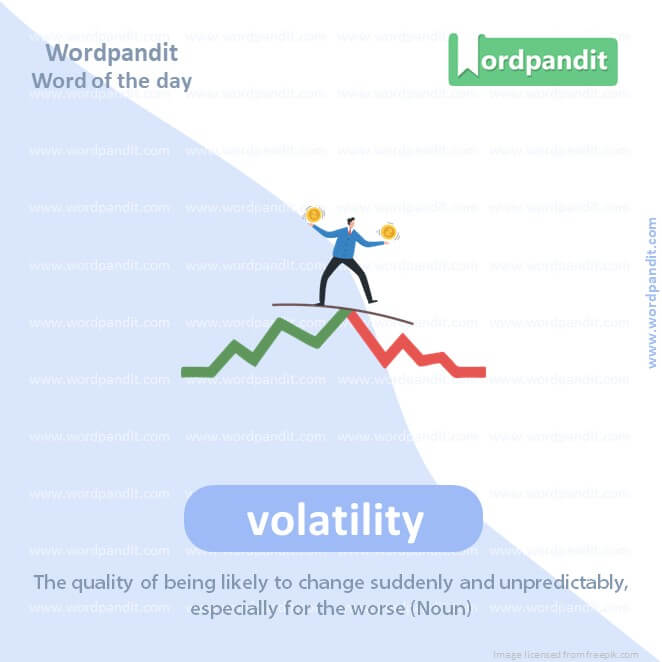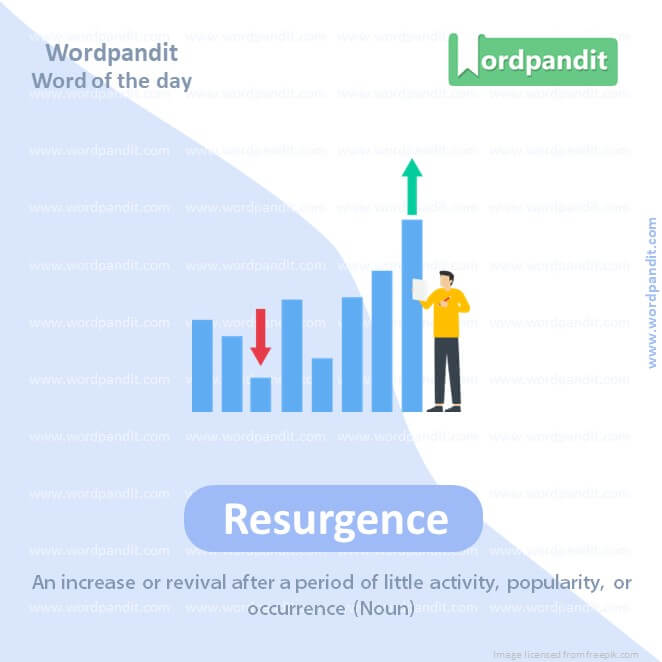Daily Vocabulary Words: List of Daily Used Words
Hi there. Welcome to this special section @ Wordpandit.
Our endeavour here is straightforward: highlighting important daily vocabulary words, you would encounter in The Hindu. This is your repository of commonly used words; essentially, we are posting a list of daily used words. Hence, this has significant practical application as it teaches you words that are commonly used in a leading publication such as The Hindu.
Visit the website daily to learn words from The Hindu.

WORD-1: Upsurge
CONTEXT: The upsurge in food prices was largely driven by cereals — the biggest constituent of the ‘food and beverages’ group — that logged 9.93% inflation.
SOURCE: The Hindu
EXPLANATORY PARAGRAPH: Imagine a lot of water suddenly rushing up onto the beach much higher than usual. That sudden increase in water is like an “upsurge.” It means a sudden rise or increase in something, like when a lot of people start buying the same toy all at once.
MEANING: A sudden increase (noun).
PRONUNCIATION: UP-surj
SYNONYMS: Rise, surge, increase, upswing, escalation
USAGE EXAMPLES:
1. There was an upsurge in demand for the new video game.
2. The company reported an upsurge in profits this quarter.
3. The upsurge in interest for online courses has been notable.
4. Health officials are concerned about the upsurge in flu cases.

WORD-2: Reassuring
CONTEXT: With the current rabi season’s sowing of pulses as on January 12, almost 8% lower than in the corresponding period of 2023, the outlook for their prices in the coming months is far from reassuring.
SOURCE: The Hindu
EXPLANATORY PARAGRAPH: Imagine you’re scared during a thunderstorm, and your mom hugs you and says everything will be okay. Her comforting words are “reassuring.” It means making someone feel less worried or scared by showing them support or giving them confidence.
MEANING: Giving comfort or confidence to someone; making someone feel less
anxious (Adjective).
PRONUNCIATION: ree-uh-SHOOR-ing
SYNONYMS: Comforting, encouraging, soothing, calming, supportive
USAGE EXAMPLES:
1. His words were reassuring after the stressful event.
2. She gave me a reassuring smile before my presentation.
3. It was reassuring to know the police were nearby.
4. The doctor’s reassuring manner helped calm the patient.

WORD-3: Volatility
CONTEXT: the seasonal volatility that vegetable prices are prone to, prices of both the kitchen staples, as well as the broader sub-group, witnessed sequential deflation.
SOURCE: The Hindu
EXPLANATORY PARAGRAPH: Imagine if one day it’s sunny and warm, and then suddenly it starts raining and gets cold, then warm again all in one day. That quick change in the weather is like “volatility.” It means when something changes quickly and unpredictably, like prices going up and down very fast.
MEANING: The quality of being likely to change suddenly and unpredictably,
especially for the worse (Noun).
PRONUNCIATION: vol-uh-TIL-ih-tee
SYNONYMS: Unpredictability, instability, changeability, fluctuation, variability
USAGE EXAMPLES:
1. The stock market is known for its volatility.
2. Economic volatility makes planning difficult.
3. The volatility in oil prices affected global markets.
4. Weather volatility can complicate growing crops.
WORD-4: Spiralling
CONTEXT: the spiralling crisis in West Asia infusing a new level of uncertainty over global trade and energy costs, policymakers have their task cut out.
SOURCE: The Hindu
EXPLANATORY PARAGRAPH: Think about when you spin around really fast, and everything seems to whirl around you. That spinning movement is like “spiralling.” It means moving in a way that circles around and around, often getting worse or out of control, like a toy spinning faster and faster.
MEANING: Increasing rapidly and uncontrollably (adjective).
PRONUNCIATION: SPY-ruh-ling
SYNONYMS: Escalating, increasing, surging, skyrocketing, ballooning
USAGE EXAMPLES:
1. The debt was spiralling out of control.
2. Prices are spiralling due to high demand.
3. The situation was spiralling into chaos.
4. Efforts to stop the spiralling conflict were unsuccessful.

WORD-5: Resurgence
CONTEXT: the key to averting its resurgence in another avatar lies in uprooting the entire network of its underground supporters.
SOURCE: The Hindu
EXPLANATORY PARAGRAPH: Imagine your favorite game was not played for a long time, and suddenly everyone starts playing it again. This coming back into popularity is called a “resurgence.” It means something becomes popular or important again after a period of being less so.
MEANING: An increase or revival after a period of little activity, popularity, or
occurrence (Noun).
PRONUNCIATION: ree-SUR-jens
SYNONYMS: Revival, comeback, renewal, rebirth, rebound
USAGE EXAMPLES:
1. There is a resurgence of interest in vinyl records.
2. The team experienced a resurgence under the new coach.
3. Health experts warned about a resurgence of the virus in winter.
4. The economic resurgence was felt across the industry.
WORD-6: Vengeance
CONTEXT: Joseph has, as his words suggest, overcome any ill-will or feeling of vengeance towards his assailants, but he rues that action against the foot soldiers of religious terror would not guarantee peace and harmony in society.
SOURCE: The Hindu
EXPLANATORY PARAGRAPH: Imagine someone took your favorite toy, and you decide to take theirs to make it even. That feeling of wanting to get back at someone for what they did is called “vengeance.” It means doing something to hurt someone because they hurt you first.
MEANING: Punishment inflicted or retribution exacted for an injury or wrong (noun).
PRONUNCIATION: VEN-juhns
SYNONYMS: Revenge, retribution, retaliation, payback, reprisal
USAGE EXAMPLES:
1. He swore vengeance against those who betrayed him.
2. The movie is about a woman seeking vengeance.
3. They plotted their vengeance in secret.
4. Vengeance can often lead to a cycle of retaliation.

WORD-7: Precisely
CONTEXT: It is precisely in these cases that government regulatory intervention becomes vital.
SOURCE: The Hindu
EXPLANATORY PARAGRAPH: Imagine you’re putting together a puzzle and you find a piece that fits exactly right, not too tight or too loose. That perfect fit is “precisely.” It means being exact about something, like saying something exactly right or doing something just the way it should be done.
MEANING: Exactly and accurately; indicating exactness or accuracy (Adverb).
PRONUNCIATION: preh-SYSE-lee
SYNONYMS: Exactly, accurately, specifically, just, perfectly
USAGE EXAMPLES:
1. The clock struck twelve precisely as they arrived.
2. She knew precisely what to say in the situation.
3. The measurements need to be made precisely.
4. He placed each item precisely where it needed to go.
WORD-8: Inundated
CONTEXT: the Internet has been inundated with AI-generated deep fake videos of celebrities.
SOURCE: The Hindu
EXPLANATORY PARAGRAPH: Imagine it starts raining a lot, and the playground gets so flooded with water that you can’t even see the ground. That’s like being “inundated.” It means being overwhelmed or flooded with too many things or too much water.
MEANING: Overwhelmed with things or people to deal with (adjective); flooded (adjective).
PRONUNCIATION: IN-un-day-ted
SYNONYMS: Overwhelmed, swamped, flooded, deluged, overloaded
USAGE EXAMPLES:
1. After the concert, the band was inundated with fan mail.
2. The streets were inundated after the heavy rains.
3. She felt inundated with work and needed a break.
4. Emergency services were inundated with calls during the storm.
WORD-9: Predominantly
CONTEXT: The online gaming industry in India is predominantly a home-grown start-up ecosystem growing at 27% CAGR.
SOURCE: The Hindu
EXPLANATORY PARAGRAPH: Imagine going to a party where almost everyone is wearing red. You could say the color red is “predominantly” seen at the party. It means mostly or mainly, like if most things or people somewhere are a certain way.
MEANING: Mainly; for the most part (adverb).
PRONUNCIATION: preh-DOM-ih-nunt-lee
SYNONYMS: Mostly, mainly, largely, chiefly, primarily
USAGE EXAMPLES:
1. The population in the region is predominantly rural.
2. The school is predominantly attended by local students.
3. The audience was predominantly made up of young adults.
4. The company’s clients are predominantly in the technology sector.
WORD-10: Exacerbated
CONTEXT: The situation is further exacerbated by the growth of illegal offshore gambling and betting markets wherein the volume of digital transactions provides fertile ground for financial malpractices.
SOURCE: The Hindu
EXPLANATORY PARAGRAPH: Imagine you have a small cut on your hand, and you keep scratching it. Instead of getting better, it starts to hurt more. That’s what “exacerbated” means. It’s when something bad gets even worse because something else made it more intense.
MEANING: Made worse or more severe (verb).
PRONUNCIATION: eg-ZAS-er-bay-ted
SYNONYMS: Worsened, intensified, aggravated, amplified, heightened
USAGE EXAMPLES:
1. The delay exacerbated the situation, causing more frustration.
2. His rude comment exacerbated the conflict between them.
3. The economic downturn was exacerbated by bad weather affecting crops.
4. Lack of sleep exacerbated her moodiness.
Vocabulary Words for IELTS'
Preparing for an esteemed examination like IELTS urges a diligent focus on ‘vocabulary words for IELTS’. These specific words, frequently prominent in IELTS examinations, play a vital role in expressing ideas effectively and articulately. To successfully conquer ‘vocabulary words for IELTS’, a strategic and focused approach is quintessential.
A fundamental step when learning ‘vocabulary words for IELTS’ is understanding these words in the context of use. For this, exposure to diverse resources like newspapers, journals, academic texts, and digital content is crucial. This engagement aids in understanding the nuances of these words, fortifying your preparation for ‘vocabulary words for IELTS’.
When tackling ‘vocabulary words for IELTS’, regular practice is the cornerstone of success. Consistent writing and speaking exercises help in embedding this vocabulary in your linguistic repertoire. Take situations or topics that commonly appear in the IELTS exam and practice crafting complex yet coherent sentences using these words.
In the journey to unfold ‘vocabulary words for IELTS’, making use of memory-enhancement techniques can orchestrate your success. Tools like flashcards and recall-based applications can significantly assist in retaining and reinforcing these words in your memory. Additionally, forming personal connections or stories with these words can greatly improve word recall.
Brevity is equally significant when preparing for ‘vocabulary words for IELTS’. Attempt to learn a limited number of words each day rather than tackling a large list all at once. This habit allows the brain adequate time to absorb and store these words securely, ensuring an effective learning experience.
In conclusion, the quest to master ‘vocabulary words for IELTS’ is an engaging dance of comprehension, practice, memory techniques, and thoughtful pacing. As you pirouette gracefully through these strategies, you’ll find communicating your IELTS responses with the right ‘vocabulary words for IELTS’ is less of a cliffhanger and more of an epic tale of language success.











